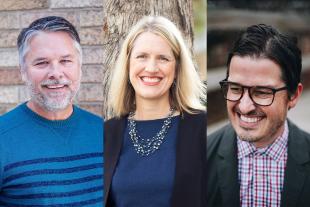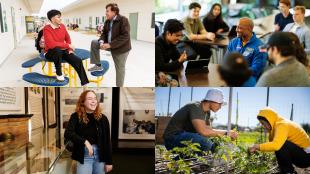'This is Their Space.' New Center Expands Services for Military-Connected Students
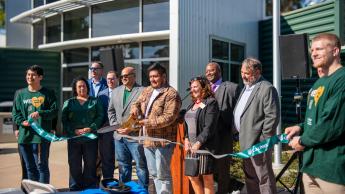
When student veteran David Gaspar-Martinez transferred to Cal Poly from Allan Hancock College in fall 2022, he found his footing through a center dedicated to students with similar backgrounds.
"One constant throughout has been the strong sense of community that I have found at the Center for Military-Connected Students," Gaspar-Martinez, a fourth-year psychology student, said in a speech at the expanded center’s dedication on Nov. 9. " Since I arrived, the center has served as a welcoming and safe space."
The dedication for the center's new space comes on the heels of the U.S. News & World Report’s annual Best College’s guidebook, released in September, that ranked Cal Poly as the top school in the West for veterans for the fourth straight year.
Cal Poly’s center serves about 700 military-connected students; 100 veterans and active-duty service members, and about 600 who are dependents of veterans. The numbers have risen over the past decade.
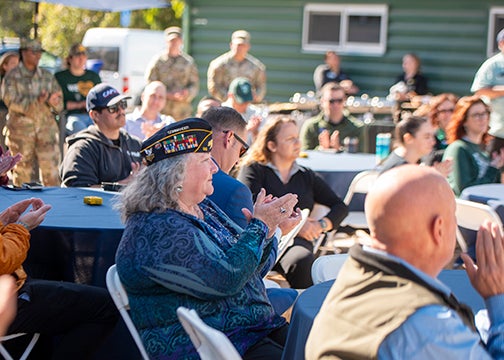
Cal Poly first opened a specific center for veterans and their dependents in 2015. The center was essentially run by student veterans until Kari Leslie became the first full-time lead coordinator in spring 2018 — allowing the center to expand its offerings, provide workshops and host events.
"We saw a huge uptick in the number of students that were using it," Leslie said. "We hit a point pre-COVID where we easily were having 45 visits from students every day. That was extraordinary, especially in that tiny space."
Earlier this year, the facility moved to a renovated space in the Welding Building (No. 58) across from the University Police Department. It is double the size of the original center, ADA-compliant, with many enhanced benefits for students: more indoor and outdoor study space, new computers, free printing, a bigger food pantry and air conditioning. The food pantry alone has received more than 850 visits since September.
“Relocating to this new larger location has allowed our community to expand as more students can now access these crucial resources,” said Gaspar-Martinez at the center's dedication.
What's unique about the Center for Military Connected Students is its student programming, Leslie said. That can run the gamut from orientations on university services, student success strategies and food insecurity to social outings, career goals and family support when active-duty parents are deployed far away.
The most fundamental, however, concern veteran benefits — and the dizzying array of needs unique to each student.
Leslie and Steven Chandler — the center's school certifying officials — work with students to submit enrollment verification to the Department of Veterans Affairs for VA education benefits, which come with very specific rules.
“When a military-connected student is getting ready to come to Cal Poly, I sit down with each and do a deep, comprehensive orientation,” Leslie said. “We talk about what their benefits are, what they have available to them, and how we are going to use them throughout the time that they’re at school.
"We do a lot of talking about what, financially, is going to make the most sense for students, and how they can get the most bang for their buck.”
Veterans tend to be transfer students in their late 20s to early 30s, who typically “jump in and hit the ground running,” she said. But the bulk of the center's population are dependents, who are generally "traditional, first-time freshmen."
"A dependent student whose parent is on active duty might be deployed very far away … in Germany, Guam, Japan, or a number of conflict zones or dangerous areas," Leslie said. “When a student is coming to us from someplace like that, we know they're going to need extra help. We have pitched in and helped students coming from overseas, making sure that their stuff gets sent to us ahead of time, and we hold onto it for them. We pick them up at the airport if they need it.”
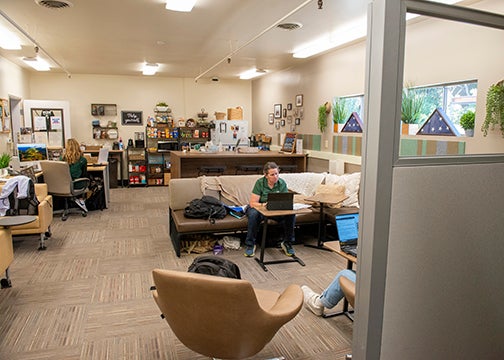
And veterans who use the center also step up and lend a hand to the younger students.
“My wonderful veterans have taught my student dependents how to drive when they come from places where they couldn’t obtain a driver's license. We’ll do anything that they need us to do," Leslie said. "We’re here as a support system because it’s not as easy for them to get them back to their parents."
The center also works to support veterans and other students with military connections who transfer into Cal Poly.
"Our transfer students at Cal Poly really find that they need help transitioning from community college or military service. They find that they need support in different ways than traditional students,” Leslie said.
And part of the support the center provides is integral to student success: community.
“Military-affiliated students need connection,” Leslie stressed.
"What the research says is that military-affiliated students and student veterans who build a community of support will do better. They will graduate sooner. They report that they have better health and well-being," she said.
Army veteran and fourth-year business administration student Sungho Park, a first-generation college student, said the center has been a fantastic resource.
“It provided me with knowledge, guidance and material help such as a physical space and food that all added up to my academic success," he said. "It keeps me involved in such a connecting way. There are many great resources available at Cal Poly, but to me specifically, no others could have been as helpful as CMCS.”
While the new center is bigger and has more ambitious offerings, it's still up to the students it serves to decide how to use it.
“This is their space,” Leslie said. “We want students to feel incredibly comfortable and use it as they need it. We want to provide whatever they need to navigate their day.”

